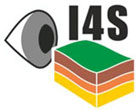Background and approach
Motivation
A detailed assessment of soil properties and a deeper understanding of soil processes are prerequisites for a site-specific and thus resource-saving and ecofriendly soil management.
In agricultural practice, however, application of technologies for site-specific fertilization, tillage, and plant protection are still not widespread. The high demand on input data is one of the main reasons why the modeling and prediction of dynamics soil processes is not yet widely applied in practice.
In particular, cost-efficient methods for detecting relevant soil properties such as soil type, nutrient, and humus content are lacking as well as easy-to-use decision support systems.
General objectives
It is the ambition of the I4S project to design of a system for fertilizer recommendations and improvement of soil functions regarding nearly every square meter of soil.
The joint project I4S aims at the development of an integrated system comprising ground sensors, models, and decision algorithms. It will in particular provide recommendations for a site-specific fertilization management and thus contribute to improving soil functions and to reducing environmental pollution.
The focus of research is on the site-specific management of the main nutrients nitrogen, phosphorus, and potassium, the soil reaction (pH) and the organic matter in the topsoil. The outcome addresses agricultural machinery manufacturers, service providers, farmers, authorities, environmental protection organizations, and research institutions.
By the use of the newly developed mobile soil sensors and tailored soil process models high spatial resolution information will be obtained that serves as the data basis for an user-friendly decision support system for managing N, P, K and liming—regarding almost every square meter of soil.
Approach
I4S takes an integrated approach: the development of the sensors and the sensor platform will be tailored both to the requirements of soil modeling as the scientific basis as well as to the needs of decision-making with respect to economic, technical and social requirements. In addition to established measurement techniques such as geo-electrics, pH-potentiometry and gamma spectroscopy, I4S sensor development will also include technologies such as Raman-, plasma-, X-ray fluorescence-, NIR- and THz laser absorption spectroscopy which have not been used for soil mapping before.The sensor data will be processed in deterministic and stochastic models to provide information on soil processes, such as the availability of nutrients and water, relevant for farming activities.
In order to transform this information into management measures, the needs of crops for fertilizer and water have to be predicted. At the same time, the cost of the measures, the technical options available on the farm as well as environmental regulations have to be taken into consideration. I4S will also provide decision support in terms of occupational health and safety, accuracy, and the cost of sensors.
Scientific Community
I4S is part of the 9 years research program BonaRes funded by the Federal Ministry of Education and Research. The BonaRes research agenda ”Soil as a Sustainable Resource for the Bio-economy“ was developed under the “National Research Strategy BioEconomy 2030”. It brings together the expertise of German scientists to explore the effect of land use on the multiple functions of soils and to develop new strategies for the sustainable use and management of soils.
BonaRes is organized in two modules. Module A comprises research projects while Module B is designated to the “BoneRes Center” which, in particular, is responsible to establish a national database of soil data and soil related process models. In total, a number of 48 German institutions are involved.

